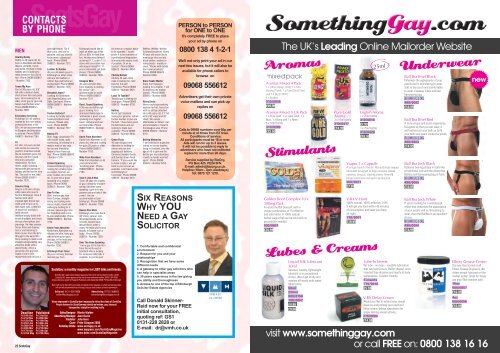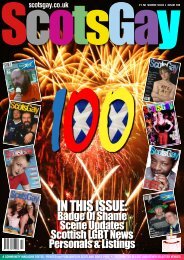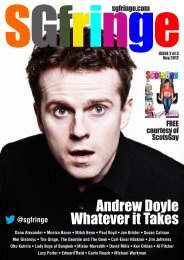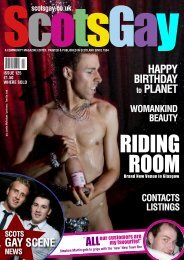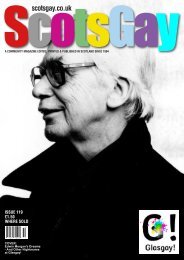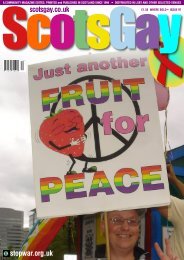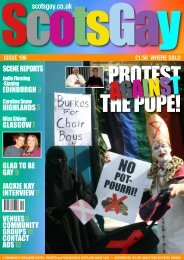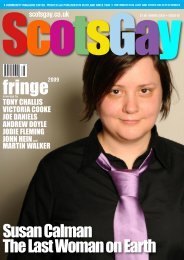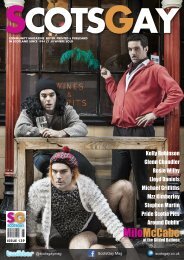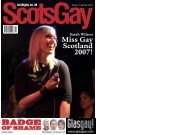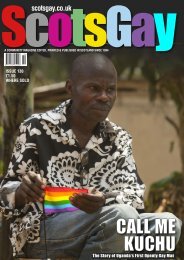Create successful ePaper yourself
Turn your PDF publications into a flip-book with our unique Google optimized e-Paper software.
<strong>ScotsGay</strong><br />
INTERVIEW<br />
andrew@scotsgay.co.uk<br />
www.andrewdoyle.co.uk<br />
Photo of Andrew<br />
© Eamon McGoldrick<br />
AndrewDoyle<br />
talksto<br />
PaulSinha<br />
Paul Sinha likes a challenge. You may<br />
have seen his appearance on a recent<br />
episode of the BBC’s weekly nerdfest<br />
Mastermind, in which he answered some<br />
rather tough questions on the sixteenthcentury<br />
Portuguese explorer Ferdinand<br />
Magellan. An odd choice of specialist<br />
subject for a stand-up comedian, it has to be<br />
said. It’s even odder when you consider that<br />
Paul knew absolutely nothing about him<br />
until two months ago. He decided to set<br />
himself the task of researching a topic from<br />
scratch for his Mastermind appearance.<br />
It’s a long story, which Paul recounts<br />
with his customary eloquence. Last year he<br />
took part in a special edition of University<br />
Challenge as one of a team made up of<br />
stand-up comedians. After a valiant halfhour<br />
of cerebral jousting, they failed to<br />
secure a victory. But Paul was hooked. He<br />
decided to enter Mastermind, and coasted<br />
through the audition with ease. Once<br />
accepted, he needed a specialist topic.<br />
“While I was preparing for University<br />
Challenge I came across the name of<br />
Ferdinand Magellan”, he explains. “So I<br />
decided to learn everything I could about<br />
him for Mastermind. It all went reasonably<br />
well, except on the show I answered the first<br />
question incorrectly. It was really easy, too.<br />
Quite embarrassing.”<br />
As a rising star of the UK comedy<br />
circuit, it seems ironic that most of his<br />
television appearances to date have been a<br />
result of his aptitude for trivia, rather than<br />
his ability to make people laugh. But as a<br />
practising GP, he’s already exceeding most<br />
people’s expectations of a typical stand-up<br />
comedian.<br />
Paul is very easy to talk to. We’ve met<br />
in The Albany, a pub just off Great Portland<br />
Street in London. When I arrive, Paul’s<br />
already drinking a latte. He tells me it’s<br />
probably too early for a beer. As a qualified<br />
doctor who likes to ridicule our bingedrinking<br />
culture when performing on stage, I<br />
had half-expected him to be teetotal.<br />
“I consider myself to be part of Britain’s<br />
binge drinking problem”, he tells me,<br />
laughing. “To a lesser extent these days, it<br />
has to be said, but I’ve certainly made a fool<br />
of myself on a number of occasions when<br />
I’ve been under the influence. A lot of my<br />
stand-up is anecdotal, so I like to talk about<br />
this topic from a personal perspective,<br />
especially since it’s one of those things that<br />
affect us all. Although I’m a gay Asian<br />
doctor, what I’ve got in common with<br />
everyone else is that I’m a man trying to go<br />
about his daily life without getting into<br />
scrapes with horrible, nasty, aggressive<br />
people. And I think that’s what seems to<br />
define us now, that were all trying to get<br />
through life and avoid trouble.”<br />
There’s an undeniable universality to<br />
this concept which must have appeal for<br />
comedy audiences who, let’s face it, have<br />
normally had one too many pints<br />
themselves. It’s a sad indictment of British<br />
culture that whenever we choose to spend<br />
an evening out on the town, we run the risk<br />
of being attacked for no comprehensible<br />
reason. Paul is interested in the arbitrary<br />
nature of such incidents, and what it<br />
suggests about our society. It’s quite<br />
ambitious territory for a stand-up comedian<br />
but, like I say, Paul Sinha likes a challenge.<br />
“We need to get far away from the idea<br />
that drinking as much as possible as quickly<br />
as possible is a viable way to have a great<br />
night. Because it isn’t. You end up in a<br />
state where you can’t remember what<br />
happened, so even if there were any magical<br />
moments you wouldn’t be able to appreciate<br />
them.”<br />
So why do you think we do it?<br />
“Fundamentally, most British people aren’t<br />
brave enough to be the people we want to<br />
be when we’re sober”, Paul suggests. “So<br />
when we get drunk we’re looking to achieve<br />
an idealised state of mind. We want to be<br />
able to approach that person we fancy, we<br />
want to be able to stand up to people who<br />
are behaving like twats. In short, we want to<br />
escape from our normal, suppressed,<br />
slightly cowardly state, and move into a<br />
state where we’re witty and entertaining and<br />
forthright.”<br />
Paul is careful to emphasise that he’s<br />
not being self-righteous. “Like I say, I’m<br />
just as bad as everyone else. When I talk<br />
about these things on stage I’m having a go<br />
at myself as much as anything. But we need<br />
to ask ourselves why British people tend<br />
towards violence when they’re intoxicated.<br />
In Iceland they binge drink from Midnight till<br />
about seven in the morning, but they’re all<br />
singing and dancing and as happy as can<br />
be. There must be some deficiency in the<br />
British psyche that’s difficult to pinpoint. I<br />
do think that people who are happily<br />
married, in love, or have children don’t tend<br />
to get violent when they’re drunk. So<br />
perhaps it’s a reflection of an underlying<br />
unhappiness with where you are as a human<br />
being.”<br />
Now that the topic of conversation has<br />
turned to family life, I take the opportunity to<br />
quiz Paul on his background. He tells me<br />
that, like himself, his parents are in the<br />
medical profession; his father is a doctor<br />
and his mother is a nurse. They came to<br />
England in 1968 from their birthplace of<br />
Calcutta, “the cultural centre of India”, as<br />
Paul describes it. Together, they provided<br />
Paul with what he describes as a “very<br />
uneventful existence in the middle of<br />
suburbia”. By his own admission, this<br />
background was hardly ripe for comedy.<br />
“I had a very dull, uneventful, middleclass,<br />
public school educated background,<br />
with the inevitable path to medical school. A<br />
lot of comics travel back to their childhood<br />
to look for the inner pain or conflict, but<br />
there really wasn’t any for me.” He laughs,<br />
and adds: “I had to find that as an adult”.<br />
Paul tells me that his parents raised him<br />
in the Hindu tradition, and I want to know<br />
whether he still identifies as such. “Yeah, I<br />
suppose”, he says after a moment’s thought.<br />
“I was raised as a Hindu, but it was all about<br />
the social ceremony of a few religious<br />
festivals and little else. It’s a cultural thing,<br />
rather than a strict adherence to a set of<br />
religious laws, much like Christians who<br />
only ever celebrate Christmas and Easter.”<br />
“Hinduism is not a label that I think<br />
about that much because I’m not a religious<br />
person. If I had to classify myself I’d say<br />
I’m an atheist who is perfectly prepared to<br />
believe he might be wrong. I definitely don’t<br />
believe in a biblical God. I believe we don’t<br />
have all the answers, and I believe we don’t<br />
know why we’re here, and I believe there<br />
could be something very odd going on in<br />
the universe that we don’t know about, but<br />
the idea of a biblical God is complete<br />
nonsense in my opinion. How can you<br />
account for a super-being who created this<br />
incredibly complex world only to be<br />
obsessed by relatively minor details? The<br />
being who created a duck-billed platypus is<br />
not going to be concerned about the gender<br />
of the person I’m sleeping with.”<br />
Paul has clearly given this issue a great<br />
deal of thought. And well he might. As we<br />
all know, much of the opposition to LGBT<br />
rights in the UK today is a result of the<br />
ignorance inherent in organised religion.<br />
Paul tells me that he finds it difficult to<br />
understand how anyone can look at our<br />
society and think that gays are the problem.<br />
“It’s funny if you think about it,” he says.<br />
“It’s not gays who are setting off bombs, it’s<br />
not gays who are causing wars, it’s not gays<br />
who are stabbing people in city centres on a<br />
Saturday night, and yet somehow certain<br />
people can look at everything that’s going on<br />
in the world and reach the baffling<br />
conclusion that it all started with the<br />
introduction of gay civil partnerships. It’s<br />
difficult to fathom.”<br />
That said, Paul is quick to point out how<br />
much progress has been made. “I’m of a<br />
generation that remembers when it was all<br />
so much worse for gay people. And I get<br />
very frustrated with those who take it for<br />
granted. Whenever I hear someone<br />
slagging off Peter Tatchell, I think to myself,<br />
‘you have no idea the degree to which he<br />
was out there fighting for your rights when it<br />
was extremely unfashionable to do so’. And<br />
there’s a whole generation of gay people<br />
who just don’t appreciate how much hard<br />
work was put in on their behalf by the likes<br />
of Tatchell. They think that life is just one<br />
big ketamine party, and I find that very<br />
frustrating. But then, I grew up in the<br />
eighties when it was definitely not cool to be<br />
gay. The tabloids were just out to destroy<br />
us, and they went about it with the most<br />
hateful language.”<br />
“One of the good things about this<br />
Labour government was how<br />
uncompromising they’ve been when it<br />
comes to pushing through pro-gay<br />
legislation. And what’s happened is that all<br />
the debates seem to have been won. If you<br />
speak out against gay civil partnerships now<br />
people think you’re a bit of a freak, because<br />
it’s pretty obvious to everyone who has eyes<br />
that gay civil partnerships are exactly that –<br />
civil. They’re a very civilising thing.<br />
Likewise, up until recently it was a<br />
mainstream viewpoint that gays shouldn’t<br />
join the Army. But if you say that these days<br />
you look like an idiot, because there have<br />
been gays in the Army for a while now and<br />
there hasn’t been a single problem. As I<br />
say, the debates have been won. The only<br />
people left are the religious because they<br />
have to believe in their book. They’ve got no<br />
other option. But the rational debates have<br />
definitely been won. I’m very much of a<br />
view that religion has no place in Western<br />
government.”<br />
Although Paul’s stand-up does<br />
incorporate such socio-political concerns,<br />
it’s essentially his undeniable ability to make<br />
people laugh that makes him so popular.<br />
Many <strong>ScotsGay</strong> readers will have seen<br />
Paul’s performances before, as he has<br />
played at a number of Scottish venues over<br />
the years. Earlier this year he performed a<br />
solo show in Perth, and he’s become a<br />
recognised feature on the Edinburgh Fringe.<br />
After a highly successful performance at The<br />
Stand in Glasgow earlier this year, he’ll be<br />
returning to the venue for a second time for<br />
Glasgay! on Sunday 5th October. He tells<br />
me that he’s very fond of the venue, and he<br />
has good reason.<br />
“I think The Stand is run in a very good<br />
way. They’re very specific about the sort of<br />
comics they book and they won’t<br />
compromise on that. It’s one of the reasons<br />
why I look forward to playing there so<br />
much. I think it’s really useful that Glasgow<br />
has a large Jongleurs club to cater for<br />
people in large groups; hen parties, birthday<br />
parties, that kind of thing. People who want<br />
a more “civilised” night generally go to The<br />
Stand. I think that’s why it works really well.<br />
They don’t have to provide a service to large<br />
groups of drunks.”<br />
Of course, there’s a tongue-in-cheek<br />
quality to Paul’s tone when he says this.<br />
Like most successful comics he does play<br />
Jongleurs regularly, and is happy to do so.<br />
“There are two sides to my comedic<br />
persona. There are the self-indulgent onehour<br />
monologues that I take to the<br />
Edinburgh Festival, and then there are the<br />
more condensed twenty minute sets that I<br />
perform at Jongleurs. It’s a very different<br />
type of experience. And that’s not to say<br />
that one is necessarily better than the other.<br />
The good thing about Jongleurs is that you<br />
can be playing to three or four hundred<br />
people in one night, something you can very<br />
rarely do when you’re a solo comedian. The<br />
bad side is that it’s difficult to relax, because<br />
you know that you’re only one mistimed<br />
joke away from the audience losing their<br />
interest or turning on you. It’s much more<br />
of a bear-pit atmosphere. A lot of people<br />
might think that doing an hour solo show is<br />
much more stressful than doing a twenty<br />
minute set in Jongleurs, but that’s not the<br />
case. People who come to see your solo<br />
show are much more patient, and more<br />
relaxed; there’s a greater sense of positivity<br />
in the room. As an audience, they tend to<br />
have different expectations.”<br />
And what about gay audiences? “I<br />
think it is a different type of atmosphere in<br />
gay venues. For instance, I’ve always<br />
written a lot of jokes about sport, because<br />
I’m a huge sports fan, and these jokes tend<br />
not to go down so well in front of<br />
predominately gay audiences. Similarly, I<br />
tell jokes about gay culture and gay<br />
subculture that won’t have as much<br />
resonance if you’re straight. To be honest<br />
I’ve never particularly gone out of my way to<br />
appeal to one type of audience or another. I<br />
try to be as universal as possible.”<br />
“The show I’m bringing up to Glasgay!<br />
is not particularly gay, although of course<br />
my anecdotes are told from a gay<br />
perspective. As I’m sure you’re aware, I’m<br />
not part of the long tradition of camp<br />
comedy or double entendres, or celebrity<br />
gossip. That’s not really what I do. My<br />
shows consist of fairly traditional,<br />
autobiographical, storytelling stand-up.<br />
I ask Paul whether he thinks that this is<br />
part of his appeal, that he is resisting the<br />
stereotype. “Well I’m not deliberately<br />
resisting the stereotype. I’m just being<br />
myself. It just so happens that I don’t look<br />
after myself, I have two gym memberships<br />
but I never go to the gym, and I’m obsessed<br />
with sport to the extent that I stay up till four<br />
in the morning watching live streams of<br />
Andy Murray playing tennis at foreign<br />
tournaments. The only stereotype I really<br />
fulfil is having a relentless appetite for men,<br />
and I’m more than happy about that.”<br />
“What I always say is that I might seem<br />
very unusual in my interests and attitudes,<br />
but I’m not. It’s just that people who are like<br />
me tend not to draw attention to themselves.<br />
There are, in fact, a huge number gay sports<br />
enthusiasts, gay football fans, gay indie<br />
music fans, whatever, but they tend to be at<br />
home rather than out on the scene. So I’m<br />
not unusual, I’m just unusual in terms of the<br />
gay entertainment circuit.”<br />
This strikes me as something of an<br />
understatement. Paul’s other career as a<br />
doctor already marks him out as an unusual<br />
candidate for stand-up. Harry Hill is another<br />
obvious example, but their styles are so<br />
wildly different that they don’t invite<br />
comparison. I ask Paul about how it feels to<br />
have two such incongruent professions.<br />
Isn’t it rather like leading a double life?<br />
“Of course, they’re very different jobs”,<br />
he tells me, leaning back in his chair. “They<br />
both involve telling lies to strangers, they<br />
both involve convincing people, and they<br />
both involve a certain degree of<br />
performance skills. But other than that<br />
they’re totally dissimilar. I don’t mix the two<br />
at all. I’m not one of these people who try<br />
to make jokes at work, far from it. I have a<br />
far more serious persona as a doctor.”<br />
I can see immediately how this would<br />
be the case. Paul comes across as a highly<br />
intelligent and thoughtful person, but with<br />
the kind of caustic objectivity that is so<br />
essential for comedic success. He’s also a<br />
real grafter, a quality evinced not only by his<br />
ability to maintain two jobs, but also by the<br />
fact that he was working the London<br />
comedy circuit when he was still<br />
undertaking medical training. “Back then, I<br />
was working 100-hour weeks as a hospital<br />
doctor, if the truth be told I wasn’t taking<br />
this comedy lark very seriously at all. It was<br />
just an interesting hobby at that point,<br />
nothing more than that. Now I’ve got to the<br />
point where I’m working less and less in the<br />
medical world. The day may come when I<br />
give it up altogether.”<br />
If his burgeoning success on the<br />
comedy circuit is anything to go by, that day<br />
cannot be very far away.<br />
Paul Sinha<br />
- King of the World!<br />
The Stand Glasgow<br />
Sunday 5th October<br />
at 8.30pm<br />
12 <strong>ScotsGay</strong> <strong>ScotsGay</strong> 13


